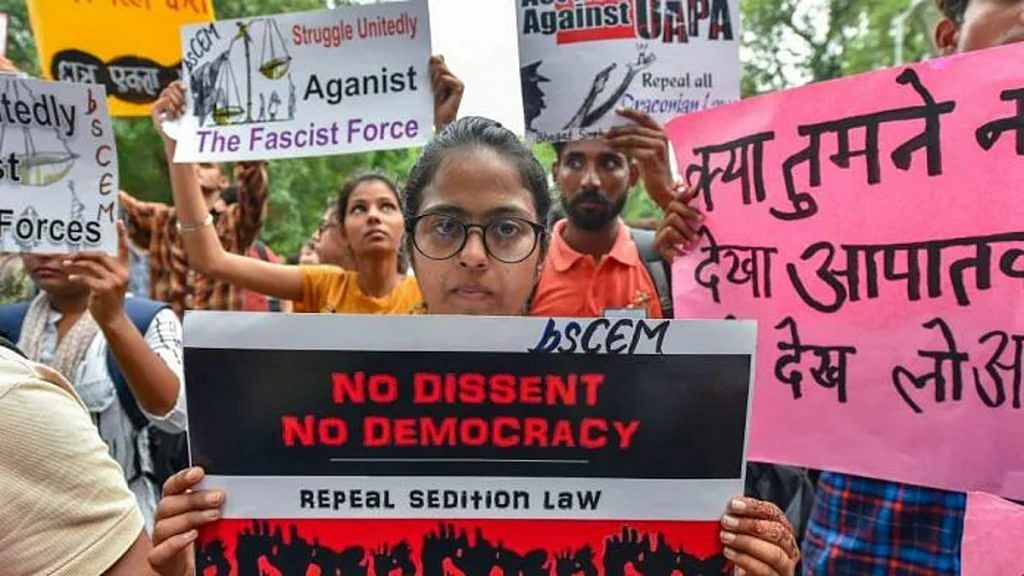New Delhi: The Narendra Modi government has told the Supreme Court (SC) that it has decided to “re-examine and re-consider” the provisions of the law on sedition (Section 124A of the Indian Penal Code, or IPC) in the wake of concerns raised about its “application and abuse”.
In an affidavit submitted Monday before the apex court, which is hearing a batch of petitions challenging the constitutional validity of Section 124A of IPC, the Union Ministry of Home Affairs (MHA) said: “The Government of India, being fully cognisant of various views being expressed on the subject of sedition and also having considered the concerns of civil liberties and human rights, while committed to maintain and protect the sovereignty and integrity of this great nation, has decided to re-examine and re-consider the provisions of Section 124A of the Indian Penal Code which can only be done before the competent forum.”
The affidavit comes in compliance with the SC’s 5 May order, asking the Centre to clarify its stand on petitions demanding Section 124A of the IPC be declared unconstitutional.
The court had, on that day, expressed disillusionment over the Centre not filing its affidavit in response to notices issued on the petitions almost eight months ago. It further told Solicitor General Tushar Mehta that it would not adjourn the hearing again due to non-availability of a government response.
In view of its latest stand, the Centre has now urged the top court not to “invest time in examining the validity of the section once again” and “be pleased to await the exercise of reconsideration to be undertaken by the Government of India before an appropriate forum where such reconsideration is constitutionally permitted”.
Signed by Mritunjay Kumar Narayan, additional secretary in the home ministry, the affidavit speaks about PM Modi’s promise to protect civil liberties of Indian citizens and also to “shed the colonial baggage”, including laws that are “causing mindless hindrances to people”.
The government, it adds, has already done away with “laws and compliance which reeked of a colonial mindset and thus have no place in today’s India”.
Section 124A of IPC states that whoever “brings or attempts to bring into hatred or contempt, or excites or attempts to excite disaffection towards the government established by law in India” can be held to have committed sedition.
Also Read: ‘Time we defined limits of sedition’: SC stays coercive action against Telugu news channels
On legal validity
On whether the section is legally valid or should be struck down, the central government’s affidavit maintains silence.
However, it acknowledges the concerns raised over its misuse. It accepts there were divergent views on the need for statutory provisions to deal with “serious offences of divisive nature affecting the very sovereignty and integrity of the country, acts leading to destabilising the government established by law and by means not authorised by law or prohibited by law”.
“Requiring a penal provision for such purposes is generally accepted by everyone in legitimate state interest. However, concerns are raised about its application and abuse for the purposes not intended by law,” the affidavit reads.
“Even the Prime Minister is cognisant of various views expressed on the subject and has periodically, before various forums, spoken unequivocally in favour of protection of civil liberties, respect of human rights and ‘giving meaning to constitutionally cherished freedoms’,” it submits.
“He has repeatedly said that one of India’s strengths is the diverse thought streams that beautifully flourish in our country,” it adds.
Making a point on how the Modi government has scrapped over 1,500 outdated British-era laws, the affidavit claimed the process undertaken since 2014, when Modi first came to power at the Centre, has ended over 25,000 compliance burdens that were causing unnecessary hurdles to citizens.
‘A larger bench’
A three-judge bench led by Chief Justice of India (CJI) N.V. Ramana will hear the petitions on sedition Tuesday.
The bench will, however, commence the hearing on a limited issue of whether the pleadings should be referred to a larger bench of seven judges or not. The requirement to do so arose when the petitioners deviated from their original prayer to refer the matter to a larger bench of seven judges.
The petitioners contended the CJI-led three-judge bench was competent to decide the petitions, despite a five-judge bench in 1962 upholding Section 124A’s constitutional validity. Even though the petitioners had originally asked the bench to refer the issue to a seven-judge bench, since a five-judge bench had already ruled on the section’s legal validity, on 5 May, they said they were giving up the plea and insisted the three-judge bench could look into the question.
However, Mehta opposed this submission. On the directions of the court, the Solicitor General filed a written submission to say that the 1962 Kedar Nath Singh verdict had “stood the test of time and needed no reference to a larger bench”. Moreover, instances of the law’s abuse, as submitted by the petitioners, cannot be a justification for its reconsideration, he submitted.
“The bench of three judges cannot reconsider the ratio of a judgment of a Constitution bench without referring the matter to a larger bench,” his submission said.
(Edited by Nida Fatima Siddiqui)
Also Read: Sedition law should be upheld, says attorney general, asks SC for guidelines to stop misuse
